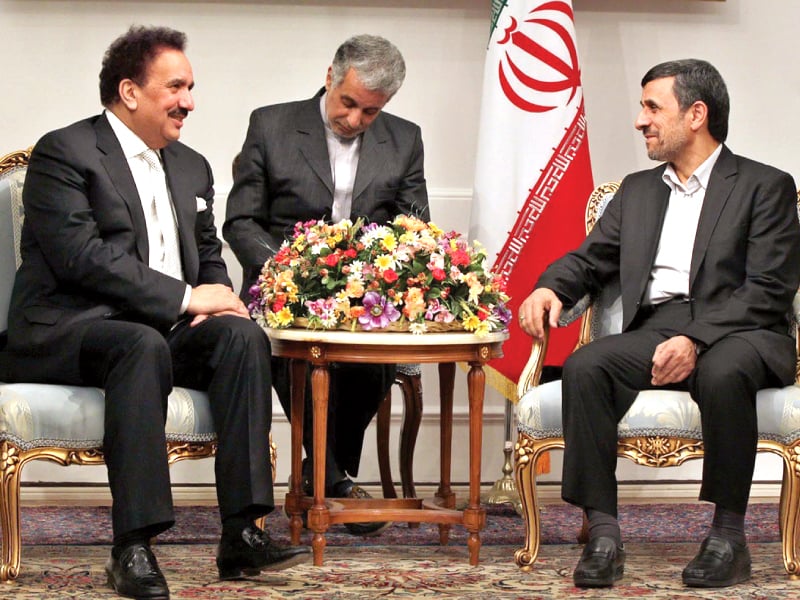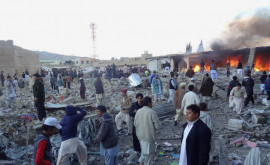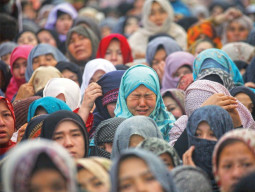
ISLAMABAD:
Tehran has assured Islamabad of its support in quelling sectarian violence in Balochistan by sharing intelligence on terrorist groups based or active along the Pakistan-Iran border.
Pakistani officials told The Express Tribune on Tuesday that Iran responded positively to Pakistan’s request for intelligence sharing, following a devastating attack on Shia Hazaras in Quetta.
They added that Interior Minister Rehman Malik sought on Monday Tehran’s help during meetings with his Iranian counterpart, Mostafa Mohammad Najjar, during his visit to Iran.
“Tehran will go the extra mile to help Islamabad bring the killers of Hazara Shias to book,” a senior official – who accompanied Malik on the trip – quoted the Iranian home minister as saying.
Both countries also agreed to set up two more check posts on the border to counter terrorists, illegal trespassing and drug smuggling, interior ministry officials said.
Najjar told Malik that a delegation from Iran would visit Islamabad to chalk out fresh ways to combat sectarian violence on both sides of the border, the officials added. The delegation is likely to arrive in Islamabad for the meetings in the first week of March.
Both sides agreed that their intelligence agencies would focus on the problems of the Hazaras in Quetta as well as in Mashad, Iran.
Officials said that Najjar and Malik signed an agreement to enhance security cooperation, and underlined the necessity for a joint campaign against terrorism in the region.
Both leaders discussed the newly proposed Navy base Iran is planning on establishing in the Sea of Oman near Pakistan’s border in Gwadar.
The Iranian president had, during a meeting with Malik, also condemned sectarian violence in Quetta, officials said.
Meanwhile, Ahlul Bayt News Agency quoted Malik as saying that the ongoing situation in Pakistan today is like that of Iran’s in the past. “A couple of years ago, Iran was entangled with terrorist group Jundullah and today Pakistan is engaged with dozens of terrorist group such as Jundullah,” he said.
Meanwhile, regarding the Sunni-Shia conflict, a former Pakistan ambassador said that Tehran has a major role in healing the chronic wounds of both communities.
Iran can spearhead a regional conference of Shia and Sunni scholars with the support of Pakistan, said BA Malik. If Sunni-majority Pakistan and Shia-majority Iran can bridge the gap between the two denominations within Islam, it would reduce tension and turn the resource-rich region into an economic power house, he concluded.
Published in The Express Tribune, February 20th, 2013.
COMMENTS (21)
Comments are moderated and generally will be posted if they are on-topic and not abusive.
For more information, please see our Comments FAQ






















































@Dr. A.K.Tewari: India comes under US's umbrella, also it does not fit with China in the equation.
Iran is responsible for destabilizing pakistan. It is responsible for killing of 10,0000 muslims in syria. Insha'ALLAH after this night,the light of the day will prevail.If you are interested,then visit iran,and consider the conditions of muslims there.Only shias, jews, and christians have the rights there. Muslims are oppressed. Shias always stab the ummah in the back. They cannot come face to face.
Nothing will come out of it. Mr.Malik is on a humble mission. He is there to offer apology for what happened again and again. Iran has its steady policy , fixed for a phase in our politics. It adjusts itself to other big players who put their money.
@ M. Omar , why forgetting to include India and Iran . Again trying to do the same mistake as it was done in the past .
Iran is our natural Friend infact brother... culturally we are mre close to iran than others in the region... we must have joint pacts with iran in all the fields
@SMAA Really? So what do you suggest? invite KSA? the holy keepers of the sacred land? keep on denying !
@navaid husain: "Here we have nations so far apart. " +++++++++++++++++++++++++++++++++++++++ Germany and France were not divided by religion. Till Pakistan becomes secular "reaching out " will not happen with India.
What a nonsense, Pakistani states seek assistance from Iran to conduct an operation against LeJ with the bogus idea of intelligence sharing. My last hope from PPP govt has vanished, the way they've dealt the Quetta incident.
@SMAA:"Isnt this foreign interference, Iran has blood of 70,000+ syrians on its hands," this statement alone tells what extent one is capable of thinking independently. Rgds P
Pakistan has friends, allies and at times an so-called "enemy". There is no problem in dealing with Iran as it is our neighbour and has a population of largely Shias. It is good to try to be on good terms with all of them.
Pakistan's problem is that it has a policy that it does not permit us toreach out. Look at Germany and Frace since the second world war. Some 50 million people were killed. Inspite of this they established good relations in a matter of 2 years. Here we have nations so far apart. It will be good to reach out to India and establish close ties, open up our borders and let people meet each other..
The Sunni groups are all concentrated in Pakistan so it is Pakistan who should be helping Iran. What a joke!
@SMAA, the US and Saudi Arabia have the blood of 70,000 Syrians on their hands by financing and arming the rebels against their own Govt. We shouldn't be so naive as to believe eveything we see on CNN and BBC.
Pakistan-Iran-China-Russia should join hands and come under one umbrella now as US leaves Afghanistan by the end of 2014. This block would be more socio-economic-geographically sound.
Iran..ask dr.Qadeer about its trustworthiness! Cannot solely rely on Iran, but obviously it's crucial to be friends with both - iran and saudiarabia. Maybe Pakistan can be that connecting factor...b/w Iran and KSA
@SMAA: " invite Iran so that Pakistan can be destabalized"
Ohhh really??? I didnt know Pakistan is stabilized already
Irani friendship is much more better than Saudis because Saudis are friends of America and Israel, so they can't be well wishers 0f Pakistan........
It would turn out like adding the petrol to the aleady-engulfing fire..
Iran humiliated Jundullah. We have common enemies over in Baluchistan. BLA and all the other crazies. Iranian help will be needed especially post ISAF withdrawal in Afg. A closer relationship with Iran is better for Pak. The saudis wont like it, but they really dont care about us, so why should we care about what the saudis think?
So has the Pipeline between Iran and Pakistan been signed or not? ++++++++++++++++++++++++++++++++++++++++
Isnt this foreign interference, Iran has blood of 70,000+ syrians on its hands, and is contiuing to meddle in the affairs of Lebanon, Syria and Bahrain yet our incompetent leaders continue to invite Iran so that Pakistan can be destabalized and burned as the countries in which Iran meddled burn . . . think
If Tehran offered intelligence sharing than what actually PPP is doing??? They should leave the Govt and hand it over to Iran, isn't it?